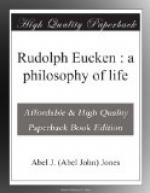Then there must be more freedom, movement, and individuality within the Church. What the Church holds as a final result of the experience of life cannot be expected as the confession of all, especially of the young. “How can every man and every child feel what such a mightily contrasted nature as Luther’s with all its convulsive experiences felt?”
Then the Church must not so much teach this or that doctrine as point to the Spiritual Life, set forth the conditions of its development, and be the representative of the higher world. Thus, and thus only, Eucken thinks that the Church can fulfil its proper function, and avoid being a danger to religion.
Eucken’s appreciation of Christianity is sincere. Viewing it from the standpoint of the Spiritual Life, he finds that it fulfils the conditions that religion should fulfil. It is based on freedom, and on the presence of the Divine in humanity, even to the extent of a complete union between them. The ideal of the Christian life is a personal life of pure inwardness, and of an ethical character. He speaks of the “flow of inner life by means of which Christianity far surpasses all other religions,” and of the “unfathomable depth and immeasurable hope which are contained in the Christian faith.”
In Christianity the life of Christ has a value transcending all time, and is a standard by which to judge all other lives. There is, too, in Christianity a complete transformation or break, which must take place before any progress or development can take place.
“There is no need of a breach with Christianity; it can be to us what a historical religion pre-eminently is meant to be—a sure pathway to truth, an awakener of immediate and intimate life, a vivid representation and realisation of an Eternal Order which all the changes of time cannot possess or destroy.”
At the same time, there are changes necessary in the form of Christianity, if it is to answer to the demands of the age, and be the Absolute Religion. It must be shorn of temporary accretions, and must cast aside the ideas of any one particular age which have now been superseded. No longer can it retain the primitive view of nature and the world which formerly obtained, no longer must it take up a somewhat negative and passive attitude, but, realising that religion is a matter of the whole life, must energetically work itself out through all departments of life. It must remedy wrong, not merely endure it. It must proceed from a narrow and subjective point of view to a cosmic one, without at the same time losing sight of the fact that religion is an inward and personal matter. It must take account to the full of the value of man as man, and of the possibilities latent in him, and take account of his own activity in his salvation.




